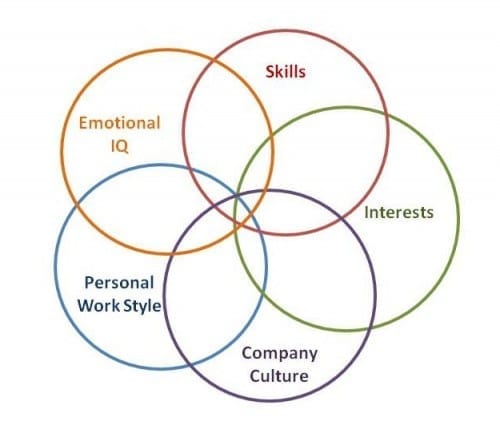Making the wrong career choice is a huge fear many transitioning job seekers face. Here’s how to assess career fit early in the decision making process.
Fix it Friday is about answering your questions!
Thanks for this reader’s question (which I have edited for brevity):
I went back to school to get a Master’s in research science, convinced that I would absolutely love it. I did like the school, but I have now had 4 experiences in the last 2 years in research labs which were all rather negative. After the first couple, I thought it was the lab. Now, I’m thinking maybe I made a bad decision? The last job was such a horrible fit, I felt the need to quit. All the jobs seemed ideal at the interview. I have a couple part-time jobs to help with income, but I really need a full-time job.
Do you have any suggestions for career guidance?
Fit Means Many Different Things
Many factors go in to a job and career being a “good fit.” These are the things I think are important to take into consideration:
- interests
- skills
- company culture
- personal work style
- emotional intelligence
It sometimes takes soul searching, assessment and pen and paper to see what’s not working. And quite honestly, when you think about what it takes to find a “good fit” or better yet, the perfect job, it is amazingly difficult! The wrong career choice can make you unhappy and not allow you to perform your best.
Before you go leaping into another job that may not be a good fit, please…consider these things!
Skills
Are the skills you are using the ones you enjoy using? We all have the capability to do lots of things, but if you don’t enjoy what you are doing, then there’s a problem.
It could be, in your case, that you loved learning concepts in the classroom, however, doing them on the job is a different story.
Make a list of the times you were happy in your jobs and specifically what you were doing and who were you helping.
Interests
Do your interests align with what you are doing? What kinds of things do you enjoy doing during your free time?
Again, it could be that you don’t care much for lab work or maybe there isn’t the greater intrinsic motivation behind what you are doing. In other words, you don’t see the value in the work you are doing.
Company Culture
The culture of a company (including management style) can make or break even the best job. If you have ever had a wonderful boss, make a list of the things they did that made working for them a great experience.
These are the qualities you should be looking for during your interviews with future managers. Company culture can be hard to pinpoint during the interview, but asking questions can help you. Create a list of what you are looking for in your next job! In case you need a definition, Wikipedia defines organizational culture as:
… the organization values, visions, norms, working language, systems, symbols, beliefs and habits. It is also the pattern of such collective behaviors and assumptions that are taught to new organizational members as a way of perceiving, and even thinking and feeling. Organizational culture affects the way people and groups interact with each other, with clients, and with stakeholders.
Your Personal Work Style
When are you at your best? In the workplace, how do you perform? Are you great working by yourself? Do you like to take on new challenges and projects? Are you a self-starter? Do you crave great work instructions?
There are many assessments that can help you pinpoint your preferred work style. Myers-Briggs, DISC and Keirsey Temperament Sorter (KTS-II) are several I am familiar with. Though they cost money to take, your career center may be able to administer them at no cost.
Emotional IQ
At the end of the day, your success is largely dependent on your emotional intelligence.
- Self-Awareness is how accurately you can identify your emotions in the moment and understand your tendencies across time and situation.
- Self-Management is how you use awareness of your emotions to create the behavior that you want.
- Social Awareness is how well you read the emotions of other people.
- Relationship Management is how you use the first three emotional intelligence skills to manage your interactions with other people.
The good news is that you can develop your emotional intelligence…if you want to. Leadership IQ conducted a study which found 46% of new hires were no longer employed after 18 months due to a lack of emotional intelligence.
Find the Intersection
Take a good hard look at what is important to you and what you LOVE doing! That’s the foundation of making a smart career choice. Be honest with yourself or get outside help if you need to. When you don’t take time to evaluate all these things, you’re more likely to make the wrong career choice or one based on things that really aren’t that important to you.
Got a job search question?
Would you like an answer to your job search question? Add it here and chances are really good that I’ll answer it!

Hannah Morgan speaks and writes about job search and career strategies. She founded CareerSherpa.net to educate professionals on how to maneuver through today’s job search process. Hannah was nominated as a LinkedIn Top Voice in Job Search and Careers and is a regular contributor to US News & World Report. She has been quoted by media outlets, including Forbes, USA Today, Money Magazine, Huffington Post, as well as many other publications. She is also author of The Infographic Resume and co-author of Social Networking for Business Success.

